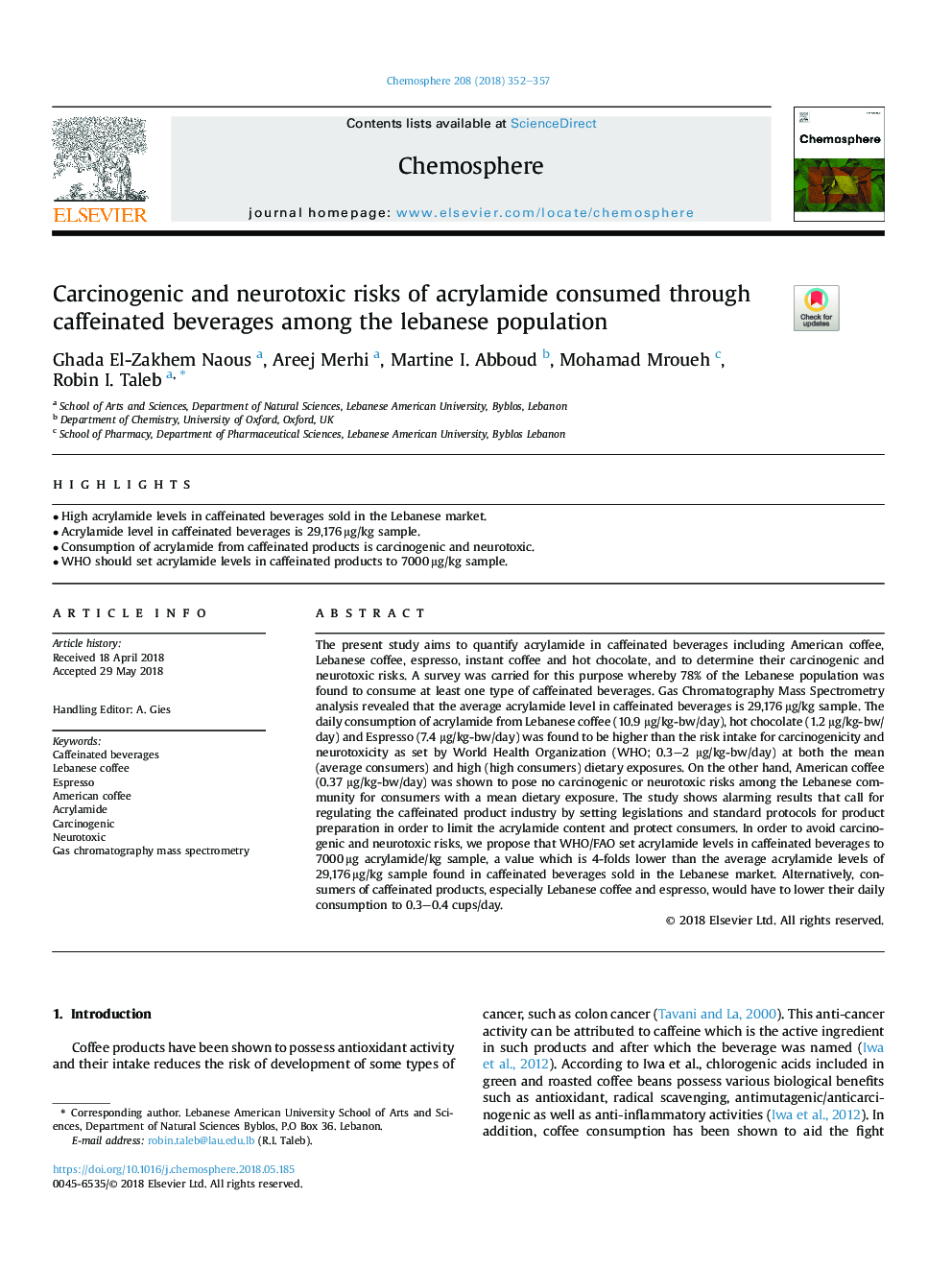| کد مقاله | کد نشریه | سال انتشار | مقاله انگلیسی | نسخه تمام متن |
|---|---|---|---|---|
| 8850737 | 1618763 | 2018 | 6 صفحه PDF | دانلود رایگان |
عنوان انگلیسی مقاله ISI
Carcinogenic and neurotoxic risks of acrylamide consumed through caffeinated beverages among the lebanese population
ترجمه فارسی عنوان
خطرات سرطان زا و عصبی از آکریلامید مصرف شده از طریق نوشیدنی های کافئین در میان جمعیت لبنانی
دانلود مقاله + سفارش ترجمه
دانلود مقاله ISI انگلیسی
رایگان برای ایرانیان
کلمات کلیدی
نوشیدنی های کافئین، قهوه لبنان، اسپرسو، قهوه آمریکا، آکریلامید، سرطان زا، عصبی طیف سنجی جرم کروماتوگرافی گاز،
موضوعات مرتبط
علوم زیستی و بیوفناوری
علوم محیط زیست
شیمی زیست محیطی
چکیده انگلیسی
The present study aims to quantify acrylamide in caffeinated beverages including American coffee, Lebanese coffee, espresso, instant coffee and hot chocolate, and to determine their carcinogenic and neurotoxic risks. A survey was carried for this purpose whereby 78% of the Lebanese population was found to consume at least one type of caffeinated beverages. Gas Chromatography Mass Spectrometry analysis revealed that the average acrylamide level in caffeinated beverages is 29,176â¯Î¼g/kg sample. The daily consumption of acrylamide from Lebanese coffee (10.9 μg/kg-bw/day), hot chocolate (1.2 μg/kg-bw/day) and Espresso (7.4 μg/kg-bw/day) was found to be higher than the risk intake for carcinogenicity and neurotoxicity as set by World Health Organization (WHO; 0.3-2 μg/kg-bw/day) at both the mean (average consumers) and high (high consumers) dietary exposures. On the other hand, American coffee (0.37 μg/kg-bw/day) was shown to pose no carcinogenic or neurotoxic risks among the Lebanese community for consumers with a mean dietary exposure. The study shows alarming results that call for regulating the caffeinated product industry by setting legislations and standard protocols for product preparation in order to limit the acrylamide content and protect consumers. In order to avoid carcinogenic and neurotoxic risks, we propose that WHO/FAO set acrylamide levels in caffeinated beverages to 7000â¯Î¼g acrylamide/kg sample, a value which is 4-folds lower than the average acrylamide levels of 29,176â¯Î¼g/kg sample found in caffeinated beverages sold in the Lebanese market. Alternatively, consumers of caffeinated products, especially Lebanese coffee and espresso, would have to lower their daily consumption to 0.3-0.4 cups/day.
ناشر
Database: Elsevier - ScienceDirect (ساینس دایرکت)
Journal: Chemosphere - Volume 208, October 2018, Pages 352-357
Journal: Chemosphere - Volume 208, October 2018, Pages 352-357
نویسندگان
Ghada El-Zakhem Naous, Areej Merhi, Martine I. Abboud, Mohamad Mroueh, Robin I. Taleb,
